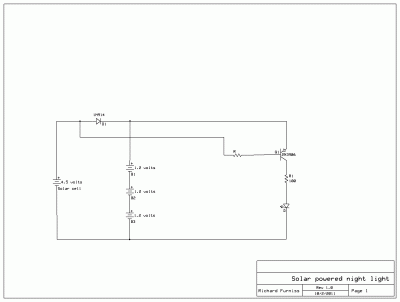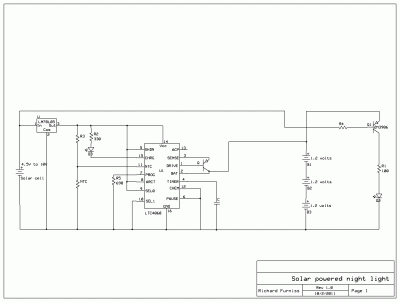Page 2 of 2
Re: Starting a project
Posted: Fri Sep 30, 2011 4:23 pm
by haklesup
With LEDs the brightness in Lumens per watt is all over the place, don't think in terms of watts for brightness anymore. You may need far less than 1W to give sufficient lighting with a newer white or blue LED. These take a lot of current but IMO you only need one or two for this job.. Now red and green generally are not as bright and you may want an array of LEDs instead. They do have high brightness in any color so start by selecting the LEDs to use and use their spec and some bench experiments with a variable supply to work out the target run current and voltage. From there you can calculate back to the needed battery capacity.
I used 3 Watts stated in the OP and a par 1.2V forward voltage for an HB LED to calculate current then multiplied by hours to get capacity. The current result seemed high to me as well. I think your project should target running closer to 300mA not 3A.
If your collector, storage battery and lamps are not co-located, you will have more flexibility in installation and in hiding the components.
A night light need not be very bright, it can also be coupled with a motion detector to toggle brightness but that will rob more current for itself you'll have to account for. If you want those bells and whistles, do it in version 2 or 3 after you get a feel for the basic charge discharge cycle and associated circuit.
For NiMh or LiIon, to get the longest life, you should never charge above 80% or discharge below 20% and you should never let it age fully charged or fully depleated. However, the cost of four NiMh AA 4400maH batteries (the good ones) is low and you can get almost 6-12Ah out of them depending on if you wire for 1.2V or 2.4V output. The cost of designing and implementing a smart charger is probably more than replacing the batteries more often. However Mr Al seems to have some nice battery technology.
I think LiIon price is prohibitive for this project and you don't require the higher power density, lighter smaller package usually needed by mobile devices. I don't think they make rechargable LiIon in AA form factor, those are single use high capacity, all the rechargables are rectangular packs and are easy to find on ebay in any number of sizes and terminations.
If you want to get fancy, get an RGB LED and make it color shifting.
Re: Starting a project
Posted: Sat Oct 01, 2011 7:59 pm
by Smoke_Maker
Thanks Hak, I found the LED I had and tested them in a dark room, one LED gives off a little more light than the 4W bulb, but the light beam is focused in a smaller area. Here is the data sheet.
http://www.mpja.com/download/15415op.pdf
These will be good for the first ones, but a wider viewing angle would be better. My test revealed that the brightness is almost constant from 3.0V to 3.6V but current dropped a lot, around 10Ma at 3.0V with 20Ma at about 3.3V.
But I'm beginning to wonder if I should be designing this around the solar cell instead of the LED???? Or should it be battery voltage???
This LED will need 3 NiMh in series. Now how big, lets say worst case it draws 20Ma for 12 hours thats 0.02Ax12hours= .24Ah or 1/4 Ah. is that right??
Re: Starting a project
Posted: Sat Oct 01, 2011 10:58 pm
by ringo47stars
I'm in the process of designing a battery charger for ni-mh batteries and maybe expanding to lithium. With a solar charger you should consider a diode or two in the plans. You can put a diode in line with a solar panel but not with a regular charger. Then if you are worried about over-charging and heating them up it is different with a solar panel because it is a charger and a plug in type might have more of a dc current that would heat up the batteries. This creates a difference between heating the batteries and over-charging them. If they can charge up to a point that makes them hot then they are like new and good, and then if they can't charge up to that point any more they are old. I leave the batteries on the charger for extended periods of time and they only charge up to a certain point without getting hot and the batteries are only a couple of years old. Hope that helps.
Re: Starting a project
Posted: Sun Oct 02, 2011 12:35 am
by sofaspud
But I'm beginning to wonder if I should be designing this around the solar cell instead of the LED???? Or should it be battery voltage???
I almost posted yesterday... will the circuit be designed for the power supply or the power supply for the circuit?
I now reiterate my previous suggestion. Find out what the objectives are. In other words, what is to be accomplished with the design. In other words, how much light, where, and for how long.
From that, I would design the LED circuits. That pretty much answers the how much and where. Then provide a power supply to answer the how long.
Re: Starting a project
Posted: Sun Oct 02, 2011 6:22 am
by Smoke_Maker
Thanks Ringo, when I get to charging I will keep that in mind and when I get to charging I sure could use your help.
sofaspud wrote: I now reiterate my previous suggestion. Find out what the objectives are. In other words, what is to be accomplished with the design. In other words, how much light, where, and for how long.
From that, I would design the LED circuits. That pretty much answers the how much and where. Then provide a power supply to answer the how long.
Thanks for the reminder, your right it's in my head but nobody else knows what it is. I got lost in looking for parts with out defining what I want.
The objective is to build a solar powered night light.
Light 2 to 3 watts of light
illumination area 2' by 2'
Run time up to 12 hours
Battery storage, 24 hours run time without charge
Battery life 5+ years
Solar powered
No 110V
Price under $60.
The circuit design will be to turn on/off the light, charge the battery, protect battery.
Re: Starting a project, solar powered night light
Posted: Sun Oct 02, 2011 10:16 am
by Smoke_Maker
Here is a place to start, the simple solar yard light upgraded to 3.6V that will turn off at sunrise and on at dusk. Now I need to add battery protection. How about a ziner to stop over charge

or should I use a comparator in the window detection mode??

- Solar powered night light
Re: Starting a project, solar powered night light
Posted: Sun Oct 02, 2011 4:38 pm
by haklesup
But I'm beginning to wonder if I should be designing this around the solar cell instead of the LED???? Or should it be battery voltage???
Exactly, you should initailly be designing all the blocks of your project simultaniously. Balancing the design choices to achieve the perfect compromise between cost and complexity while providing a good match to the design goals is what engineering is all about.
PS. Add the control circuit to that list.
Earlier I gave a wrong capacity for NiMh AA batteries. It's more like 1800mAh to 2700mAh per battery. So taking a middle quality 2200mAh battery 3 in series you still have 2200mAh (assuming all 3 batteries are well matched) 2200mAh/20mA=110Hrs so capacity is not an issue, you have plenty of reserve with those specs.
Your next challenge is to find a solar panel that can supply at least that much current times hours. so if diffuse sunlight is always available 6 hours a day minimum and you need to replace 20mA*12 hours of nightlight use (240mAh) then the panel needs to supply 40mA (240mAh/6h) on a cloudy day. any more or less than that duiring best and worst cases is where your design compromise options come in.
Re: Starting a project, solar powered night light
Posted: Sun Oct 02, 2011 6:13 pm
by Smoke_Maker
To protect the battery I'm thinking of this
http://www.linear.com/product/LTC4060
Standalone Linear NiMH/NiCd Fast Battery Charger
and for the solar cell
http://www.herbach.com/Merchant2/mercha ... y_Code=SED
Rated 10 VDC open circuit, 8 volts at 60mA. Short circuit current 80mA
The price looks good and the LTC4060 looks like it will play well with the solar cell. I will try and roll these parts together this week and post some progress.
Re: Starting a project, solar powered night light
Posted: Mon Oct 03, 2011 5:57 pm
by Bob Scott
I remember a project in Radio Electronics called "Solar Powered Night Light". I believe it was April 1971 or 1972. Of course it was an April Fools' project (no battery), along with a windshield rain detector to tell you when to turn on your wipers.

Re: Starting a project, solar powered night light
Posted: Tue Oct 04, 2011 5:52 pm
by Smoke_Maker
OK, I rolled it together, do you think I should put a zener on the solar panel??
http://www.national.com/pf/LM/LM78L05.html#Overview
http://www.linear.com/product/LTC4060

- Solar night light 2
Re: Starting a project, solar powered night light
Posted: Wed Oct 05, 2011 2:55 pm
by jwax
You won't have to worry about overcharging if you only use one of those 60 mA soalr cells.
Probably want at least 4 of those to yield 240 mA of charging current.
Re: Starting a project, solar powered night light
Posted: Wed Oct 05, 2011 2:58 pm
by haklesup
Probably want at least 4 of those to yield 240 mA of charging current.
Only if he wants to replace 12 hours of use with 1 hour of charging. With one panel, a days charge will be replaced in 4 hours
Re: Starting a project, solar powered night light
Posted: Wed Oct 05, 2011 3:06 pm
by jwax
Righto haklesup! My thinking cap was on wrong!

Re: Starting a project, solar powered night light
Posted: Wed Oct 05, 2011 4:04 pm
by haklesup
Righto haklesup! My thinking cap was on wrong!
(electrolytic) Sleeping cap rather
or reading by the light of a night light
Re: Starting a project, solar powered night light
Posted: Fri Dec 02, 2011 11:25 pm
by ringo47stars
I leave the batteries on the charger for extended periods of time and they only charge up to a certain point without getting hot and the batteries are only a couple of years old.
You might want to ignore that part because I found out my charger wasn't working too good. I thought it was nice because I didn't have to keep an eye on it when charging but the batteries eventually ended up not working for very long. Then when I tried new batteries they did the same thing.